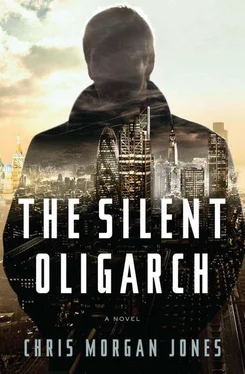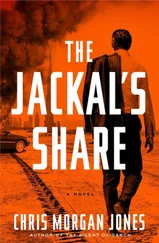At Stansted he had bought a suitcase and to put in it a new sweater, shirts, T-shirts to sleep in, socks, underwear, a razor, a toothbrush, a book— Middlemarch, of all things; after Cayman he had always meant to read it—a notebook, a guide to Berlin and two bottles of decent malt. These new possessions felt like the starter kit for a new identity that he had not yet defined. In the pockets of his coat he had two pay-as-you-go phones that Webster had arranged. One was for calls to a third, virgin phone, which Webster would keep, the other for any calls Lock might need to make in Berlin. All were for practical purposes untraceable, apparently. And in his wallet he had five thousand euros. He was all set. All set for a raid behind the wall to retrieve his identity.
He had arrived in Rotterdam an hour or so after dark. He had hired a car, a good one, an Audi, since it was less conspicuous in Germany to drive an expensive car than a cheap one, and then set off, the satellite navigation telling him in calm Dutch where to go from time to time. It felt strange to be driving; in Moscow he was driven, and everywhere else he took taxis. He enjoyed the car’s solidity, its sureness, the impression it gave that it knew where it was going. He was conscious for the first time in years of the distance between places, between Rotterdam and Utrecht, between Arnhem and Dortmund, and he enjoyed that too.
Maybe in this car the Swiss wouldn’t stop him at the border. Maybe he should give it a go. No, he thought. Perhaps after Berlin.
HE SPENT THE NIGHT in a motel just off the autobahn outside Hannover. The line about his briefcase had worked and he hadn’t had to show his passport. It was strange that even now—he was on the run, for heaven’s sake, if you could be on the run from your boss—these little lies unnerved him. He paid cash in advance and wondered whether that would be the thing that finally made the tired-looking Polish clerk suspicious enough to call the authorities. Which authorities he had no idea.
But no one came for him in the night. After a sandwich that he had bought in Rotterdam and a glass or two of the Scotch, he slept a solid, heavy sleep with no dreams, waking just before the dawn with a sore throat and a headache. He hadn’t opened a window and the room was hot. He showered and dressed and left in fifteen minutes, discovering as he stepped out into the cold air that it had snowed in the night and was snowing still, fat soft flakes settling on the hoods and roofs of cars. The road itself was smeared with an ugly gray paste of slush and grit and oil, and the journey took twice as long as it should. But here he was, approaching Berlin from the west, warm and safe.
He didn’t know the city. It wasn’t a place he had ever needed to visit: Frankfurt, yes, for its banks, but otherwise Germany had never been important in his scheme. He followed the signs to the center, hoping from there to see signs for Kreuzberg. Through Charlottenburg, through the Tiergarten, past the Reichstag; he eventually found himself on Unter den Linden, driving along the wide boulevard whose name he had heard so often. It was less pretty than he had expected: it looked as if the massive buildings on either side, the hotels and offices and government buildings, had bullied all the leaves off the bare limbs and left the trees cowering in the middle of the road.
It was strange to be driving in a city he didn’t know. It took him nearly an hour to find the hotel. The Hotel Daniel, in a residential street near the canal. It was small, and dark in a comforting way, and he was shown to his room by a bulky, smiling woman in her seventies who spoke little English but understood him well enough. He gave his name as Mr. Green. When he started to explain about his passport she simply waved him away.
The room was papered with red and cream stripes, and fitted out with furniture that didn’t match and was a little too good for a hotel of this kind. A double bed with a small mahogany table by its head; a wardrobe, mahogany again and rather grand, with an oval mirror set into its single door; a chest of drawers; a desk and chair. From his window Lock could see through trees the canal and the U-bahn track above it, and beyond that a solid redbrick church and layers of boxlike apartment buildings stretching back into Mitte. A train ran past from left to right, its orange carriages the only color in a world of white and gray.
Lock unpacked his new things, taking his shirts from their plastic packages and hanging them, creased, in the wardrobe. He checked the charge on his phones. Should he call Nina now? Something held him back. He thought for a moment that it was the prospect of seeing his dead friend’s wife and being rejected, or not knowing what to say. But that wasn’t it. If Nina had nothing, knew nothing, then the last prospect of some sort of dignified escape from all this, however fantastical, was gone. Here in this comfortable room, snow blanking out the world around, that was a moment he could happily delay.
He would write her a note. Or better, a letter of condolence. He was in Berlin, and would very much like to see her. That was natural, after all: they had met, and Dmitry had been his friend.
He took his time with it, writing it out in his notebook first before copying it carefully onto a sheet of the Daniel’s letterhead. When he finished he called down to reception and managed to explain in English, Dutch, and broken German that he wanted a taxi.
HE NEEDED FOOD, AND AIR. Outside the snow was now a gray mud on the pavements. Lock could feel his shoes cold on his feet and knew that icy water was about to leak through the soles and seams. Soft flakes had given way to something between hail and sleet and the easterly wind froze his face. He walked on the main road, leaning into the cold as it came at him, taking in little but the noise of the cars and the people hurrying past him on their way home. He had little idea where he was; he had a map but there was no point in trying to open it.
At Wittenbergplatz he turned left into quieter streets in search of a bar. Thank God for bars. When he found one it was less a bar than a café, rather grand and Viennese, but it would do. It was warm, and warmly lit, and he found a booth that seemed the most comfortable thing he had ever seen.
He ordered beer, because this was Germany, and drank the first one in four or five deep swallows. Another came. He looked at the menu and ordered food: gravlax and Wiener schnitzel.
From his coat he took one of his phones. He looked at it for a while and then put it on the table. It continued to attract him. He wanted to call Marina, to tell her he was all right and that he had a plan, but he wasn’t sure he should. Webster had said he could make calls, hadn’t he? Halfway through his third beer he surrendered.
“Marina?”
“Richard?”
“Hi. I thought I should call.”
“Richard, where are you?”
“I shouldn’t say. I just… I wanted to tell you I’m OK.”
“Vika wants to see you. I think she can tell I’m worried.”
Lock rubbed his eyes with his free hand, pinching the bridge of his nose.
“I’ll see her soon,” he said. “Tell her I’ll see her soon.”
There was a pause. “I stood there,” said Marina, “whispering your name over the wall.”
“I’m sorry. I was fine. I should have said.”
They were silent again.
“I did what you suggested,” Lock said.
“What?”
“I got some help. I’m trying to find a way out. It’s better already. Being free. I can think more clearly.”
“That’s good, Richard, but… You’re not going to run off? I don’t think I could stand it.”
“No. No, I’m not.”
“I thought you had.”
“I’m going to face it. I think I have to.”
Читать дальше












